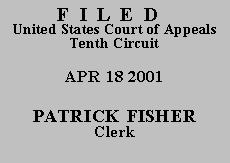

| UNITED STATES OF AMERICA,
Plaintiff-Appellee, Defendant-Appellant. |
No. 00-3253
(D.C. No. 99-CR-10158-MLB) (Kansas) |
Anders holds that "if counsel finds his case to be wholly frivolous, after a conscientious examination of it, he should so advise the court and request permission to withdraw." Anders, 386 U.S. at 744. Counsel must also submit a brief "referring to anything in the record that might arguably support the appeal." Id. The appellant must be furnished with a copy of counsel's brief and must be allowed time to raise "any points that he chooses; the court . . . then proceeds, after a full examination of all the proceedings, to decide whether the case is wholly frivolous." Id. If the court finds the case frivolous, it may grant counsel's request to withdraw and dismiss the appeal. Id.
In his brief, counsel for Mr. Helbach has identified only one potentially appealable issue for our consideration. That issue is whether the district court erred in refusing to exercise its discretion to sentence Mr. Helbach to a term of imprisonment less than that suggested by the Sentencing Guidelines. More properly, the issue is whether this Court has jurisdiction to review the district court's refusal to depart downwards from the Sentencing Guidelines.
"We have jurisdiction to review a district court's refusal to depart downward only when 'the district court refused to depart because it erroneously interpreted the Guidelines as depriving it of the power to depart based on the proffered circumstances.'" United States v. Rowen, 73 F.3d 1061, 1063 (10th Cir. 1996)(quoting United States v. Barrera-Barron, 996 F.2d 244, 245 (10th Cir.), cert. denied, 510 U.S. 937 (1993)). We have held that a district court's failure to explicitly acknowledge its discretion does not make a sentence improper because we assume the district court is aware of its discretion. Id.
In the case at hand, the court was fully aware of its discretion under the Sentencing Guidelines. During the sentencing of Mr. Helbach, the court specifically noted that although it chose not to depart downward based on the factors presented to the court by Mr. Helbach, "I have the authority to impose or to consider a downward departure." Rec., vol. II, doc. 30 at 58.
Because the district court clearly understood its power to depart downwards, this Court has no jurisdiction over the instant appeal. Under the standards of Anders, we hold that Mr. Helbach's appeal is wholly without merit.
We therefore grant counsel leave to withdraw and DISMISS the appeal.
ENTERED FOR THE COURT
Stephanie K. Seymour
Circuit Judge
*.After examining appellant's brief and the appellate record, this panel has determined unanimously that oral argument would not materially assist the determination of this appeal. See Fed. R. App. P. 34(a)(2) and 10th Cir. R. 34.1(G). The case is therefore submitted without oral argument. This order and judgment is not binding precedent, except under the doctrines of law of the case, res judicata, or collateral estoppel. The court generally disfavors the citation of orders and judgments; nevertheless, an order and judgment may be cited under the terms and conditions of 10th Cir. R. 36.3.